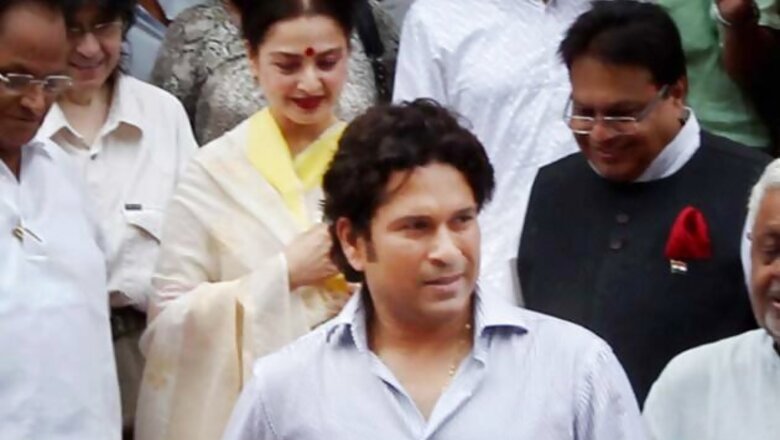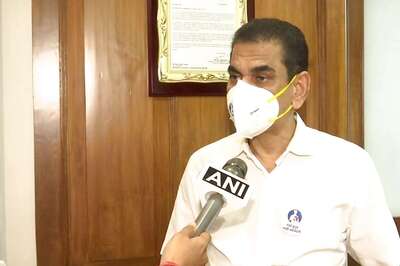
views
New Delhi: Noted cricketer Sachin Tendulkar and veteran actress Rekha are facing severe criticism from the members in and out of Parliament for their absence from the House of Elders. When Cricket legend Sachin Tendulkar and veteran actress Rekha were nominated to the Rajya Sabha in 2012, many doubts were expressed over the selection procedures. There were arguments that being a legend in cricket is not a good enough criteria for Tendulkar to be nominated as a member of the Upper House.
His critics had predicted that he may not attend sessions of Parliament and he has proved them right by attending the session only thrice. Rekha, whose nomination for the Upper House too had been controversial, has also attended Parliament only five times so far.
Like all MPs, nominated members also get Rs 5 crore every year for their local area development fund which they can use for minor developmental work in their area but both these leaders have not spent even a rupee from the funds.
The fellow members in the Rajya Sabha are now demanding that both Tendulkar and Rekha must take part in the session. Some are also demanding that both of them should be declared absentee members.
Clarifying the stand, Deputy Chairman of Rajya Sabha PJ Kurien said that, if any member is absent from the House for 60 days without an official leave, his or her post can be declared vacant posts.
An embarrassed Congress which nominated these two personalities to Rajya Sabha is now urging them to take part in the proceedings of the House. Famous lyricist Javed Akhtar, another nominated member of the House, launched a scathing attack on Sachin and Rekha and said that they must attend the house.
Since there are just 4 days left in the ongoing session, one can hope that both Sachin and Rekha will make an appearance at least once before the session ends.
Leave of absence from meetings of Council
(1) A member wishing to obtain permission of the Council for remaining absent from meetings thereof under clause (4) of article 101 of the Constitution shall make an application in writing to the Chairman, stating the period for which he may be permitted to be absent from the meetings of the Council.
(2) After the receipt of an application under sub-rule (1) of this rule the Chairman shall, as soon as may be, read out the application to the Council and ask: "Is it the pleasure of the Council that permission be granted to such and such a member for remaining absent from all meetings of the Council for such and such a period?" If no one dissents, the Chairman shall say: "Permission to remain absent is granted." But if any dissentient voice is heard, the Chairman shall take the sense of the Council and thereupon declare the determination of the Council.
(3) No discussion shall take place on any question before the Council under this rule.
(4) The Secretary-General shall, as soon as may be, after a decision has been signified by the Council, communicate it to the member
Who are the nominated members?
Under Article 80 of the Constitution, the Council of States (Rajya Sabha) is composed of not more than 250 members, of whom 12 are nominated by the President of India from amongst persons who have special knowledge or practical experience in respect of such matters as literature, science, art and social service. By adopting the principle of nomination in Rajya Sabha, the Constitution has ensured that the nation must also receive services of the most distinguished persons of the country who have earned distinction in their field of activity, many of whom may not like to face the rough and tumble of the election.
By nominating them to Rajya Sabha, the State not only recognises their merit and confers honour on them, but also enables them to enrich the debates by their expertise and knowledge that they have in different areas. The first batch of 12 nominated members represented a galaxy of talented persons of proven merit. They were: scholar and educationist Dr. Zakir Husain, renowned historians Dr. Kalidas Nag and Dr. Radha Kumud Mookerji, national poet Shri Maithilisharan Gupta, well-known Gandhian author Kakasaheb Kalelkar, eminent scientist Professor Satyendranath Bose, social worker Shri NR Malkani, renowned exponent of classical dance forms Shrimati Rukmini Devi Arundale, Gandhian scholar and teacher, Dr. JM Kumarappa, legal luminary Dr. Alladi Krishnaswami, famous stage actor and cine star Shri Prithviraj Kapoor and eminent medical scientist Major-General SS Sokhey.
Speaking about the nominated members, Jawaharlal Nehru said in the House of the People on 13 May 1953:
The President has nominated some members of the Council of States who, if I may say so, are among the most distinguished, taking everybody in Parliament altogether - it is true, distinguished in arts, science, etc. - and our Constitution in its wisdom gave that. They do not represent political parties or anything, but they represent really the high watermark of literature or art or culture or whatever it may be.
Since the Rajya Sabha was constituted in 1952, in all, one hundred and five members have so far been nominated to the House. Among these nominated members we find scholars, jurists, educationists, historians, scientists, poets and litterateurs, engineers, economists, administrators, artistes and social workers of proven ability and outstanding merit.
Nominated members enjoy all powers, privileges and immunities available to an elected Member of Parliament. They take part in the proceedings of the House as any other member. They, however, are not entitled to vote in the election of the President of India. But in the election of the Vice-President of India, they have a right to vote. So far, none from them has been inducted into the Council of Ministers.
A nominated member is allowed six months, should he decide to join a political party after he has taken his seat in the House in terms of article 99 of the Constitution. A nominated member has also been exempted from filing his assets and liabilities under Section 75A of the Representation of the Peoples Act, 1951 which requires the elected member to do so within 90 days of his making or subscribing oath/affirmation.



















Comments
0 comment